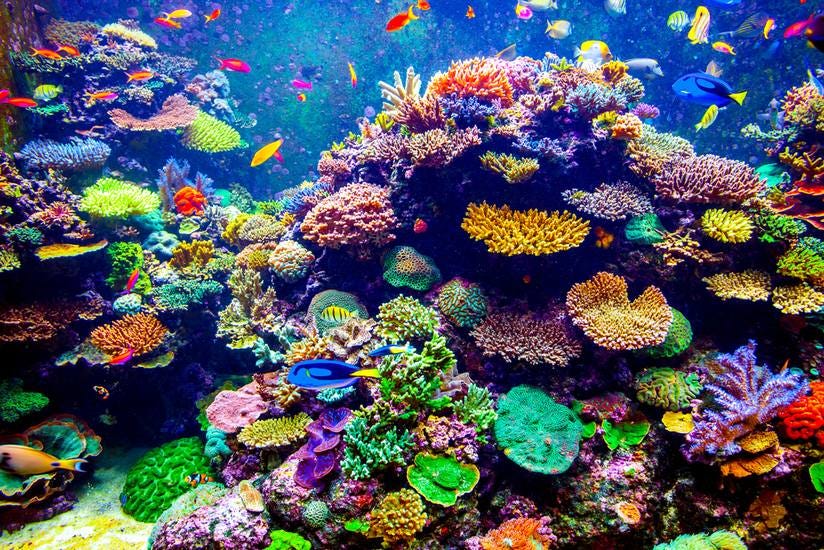Business can be a remarkable tool for positive social and environmental impact without sacrificing profit. If business depends on a healthy society and planet, how can business contribute to them in turn? The following post is part of an essay series by voices within the B Corp community on the topic of interdependence. These leaders are reimagining the role of business in society — and finding success in more ways than one. This post is contributed by James Perry, who is co-founder and co-owner of COOK, CEO of Panahpur, and co-chair of B Lab UK.
Since World War II, we have had just one political idea — the idea of individualism. So comprehensively has it permeated our political discourse, and so dominant has it become, that it has resulted in the monoculturing of global politics — famously hailed by Fukiyama as “The End of History.” The failure of this monoculturing is now so absolute that it is causing the post-War consensus to unravel, and it is rendering all of its public institutions at best unstable, or at worst meaningless. Fukiyama recanted in recognition that, like it or not, history is back — and in danger of repeating itself.
“In our individualist world, business is the poacher that makes money and dumps externalities on civil society. It has no responsibility for those externalities because it has outsourced those to government. In an interdependent world, business makes money and avoids dumping externalities on civil society, instead seeking to enrich and repair it.”
Individualism is so insidious that many do not even think of it as a political idea. But insofar as politics is defined as “the activities associated with the governance of a country or area,” no idea has been more influential over the last 50 years — and, hence, no idea more political.

In the post-War period, the idea of individualism quietly spread, at just the time that the great pre-War political battle lines between the left (the interests of labour) and the right (the interests of capital) were starting to disintegrate. To all but the most hard-core party political hacks, it became obvious that both labour and capital are critical, and the idea that one must choose between them is bogus. As these old battle lines fell away, individualism silently, completely and globally infiltrated and co-opted all mainstream politics — whether left, right or liberal.
What are the implications of this invisible ideology of individualism? By definition, it is unable to place value on the rich tapestry of relationships that make us human, that make life worthwhile, and on which our society depends — relationships with each other and with our world. Rather, it says that all things — especially people — can be reduced to individual and measurable units of production, consumption and taxation. That all policies should prioritize individual rights (to maximize the self) over individual responsibility (to contribute to the whole).
Paralyzed and Trapped by the System
There are two core consequences of this reductionist view of humanity and society. The first is an obsession with evidence. If it cannot be measured, in effect, it doesn’t exist. The second is the creation of giant bureaucracies to process these commoditised units. These bureaucracies emerge in the private sector with ever more powerful and complex global corporations, and they also emerge in the public sector.
This organisational gigantism has created a global class of bureaucrats who, like an invisible film, have wrapped themselves around the world economy. They form a vast hierarchy of global citizens (and their servants) who flit between government, media and business, and between regulator and regulated. They seamlessly move from private consulting on tax-avoidance strategies to public roles for revenue-collection agencies. And back again.
So distanced are the elites of the bureaucracy from “civilians” that the bureaucracy has ceased to be able to communicate with them. Either it speaks “Davos,” that language of concepts, or it speaks “PR,” that language of honey, fearmongering, celebrity and unfulfillable promises.
In terms of public policy, there are also two core consequences arising from individualism. The first is political paralysis, which arises from the inability to act without retrospective and comprehensive evidence. Thus, all interventions which cannot be readily measured are excluded from rational decision-making, denying policymakers the opportunity to participate in the finest and most hopeful aspects of the human condition. It also means that policymakers cannot anticipate and avert problems — such as the social implications of artificial intelligence — as this would involve an unevidenced denial of commercial rights. Instead, government must wait for evidence of harm and then pick up the tab, whilst forlornly trying to retrofit solutions to runaway trains.
The second consequence is a withering of authentic political debate. Stripped of real meaning or purpose, the stage of politics is barren. Those who are interested in “the activities associated with the governance of a country or area” — i.e. politics — are busy governing the bureaucracy without being troubled by the public, messy business of politics. Government is the sum of lobbyists, so it is logical — and cleaner — to simply rule the lobby, including public opinion.
Meanwhile, the patient of society gets ever sicker, as its life-force is sapped by the bureaucracy — whose lame efforts to reign in its more obvious excesses are held in ever greater contempt by civilians.
But it is not enough to rage against the machines of individualism. The time has come to articulate a new political idea to replace the social and environmental catastrophe of individualism, and offer the chance to repair the damage that it has done over the last 50 years.
The Dawn of the Age of Interdependence
We are, of course, individuals. But we do not exist in a vacuum. Our fulfilment and existence depend on friends, family, community, food systems and ecosystems. The path to change is to recognise our Interdependence. This is not a choice that we make. It simply the acknowledgement of the most ancient of truths. A conviction, an imperative, an inspiration.
Interdependence is an idea in direct opposition to individualism. It is its equal as well as its opposite, and it is coalescing and organising in exactly the same spontaneous way that individualism organised. It is a political movement, and, like individualism before it, the change has happened in the heads and hearts of a generation. In the 1960s it was the baby boomers, and now it is the millennials. And, just like in the decades that followed the 1960s, this movement is about to transform our world.
Interdependence is so opposed to individualism that it requires all the underlying assumptions of our Individualistic social design to be rethought. Individualism outsourced responsibility — to government or charities mostly — to focus on me, today. By contrast, Interdependence insources responsibility — to focus on us, today and tomorrow. It says that government and nonprofits can’t solve our great challenges alone.
Individualism says that it is someone else’s job to make the world better, and it’s my job to put some coins in their bucket. Interdependence says that it’s my job to make the world better. It recognises that I am not a powerless individual, but rather a part of a powerful community.
We understand that by diverting consumption away from parasitic companies, we can take away their lifeblood. We won’t work in the great bureaucracies of the individualist era. Instead, we choose to use our talent to shape a world we want for our children. We are learning that we can use our savings to create this world, understanding that our $71 trillion dollars of invested capital will shape it more profoundly than any politicians.
This interdependent phenomenon has started to spontaneously organise, but not through traditional political or consumer channels. Rather, it organises through climate action, conscious consumerism, impact investing, open-sourced technology, a circular economy, purposeful work, B Corporations, crowdfunding and sustainability. The individualist bureaucracy and their media watch in bafflement as millennials increasingly ignore them and as they walk away to spend their careers — and their money — in these new, interdependent, places.
Interdependence changes the role of government. In our individualist world, business is the poacher that makes money and dumps externalities on civil society. It has no responsibility for those externalities because it has outsourced those to government. Government is the gamekeeper hunting down business through regulation, and taxing shareholders and companies for funds to fix the problems. Meanwhile business buys the lobby.
In an interdependent world, business makes money and avoids dumping externalities on civil society, instead seeking to enrich and repair it. The more it enriches and repairs, the more it is rewarded by the interdependent consumer — some large institutions are showing encouraging signs of waking up to this. It wants to pay its taxes, because that is part of its role. Interdependent government’s role is to promote alignment and incentivise. It asserts that with limited financial liability comes social responsibility. So, an interdependent tax system incentivises net positive behaviour and dis-incentivises the net negative.
Where the individualist world casts its civilians in the passive role of consumers, the Interdependent world casts them as citizens. Citizenship restores agency, and responsibility, for shaping our own lives and our community. No longer are we consumers of a health service, which is responsible for making us healthy. Instead, we are citizens responsible for supporting the health of our families and community.
Individualism views the rich tapestry of social bonds that makes us resilient and self-reliant — whether families, communities or countries — with suspicion, as antipathetic to individual rights. By contrast, interdependence seeks to strengthen and multiply those bonds, recognising that it is more important to be together than to be in agreement.
So, where individualism requires a government-operated welfare state and regulation — both of which are manifestly in various stages of meltdown — interdependence opens up the potential for a welfare state operated by citizens, whether civil society or business. They do so in partnership with government, because it might deliver better outcomes for those in need, more efficiently. The nature of regulation is fundamentally changed as gamekeeper versus poacher is replaced by fostering collaboration, intermediating relationships (by policing good faith), and supporting transparency and understanding through the development of better information.
The shift from individualism to interdependence has already happened. It happened in the hearts and minds of those who will soon hold the levers of power. Now we have the unique opportunity to shape this coming age of interdependence. For the benefit of us all, today and tomorrow.
A version of this article originally appeared on B the Change. COOK is part of the community of Certified B Corporations. Read more stories of people using business as a force for good in B the Change, or sign up to receive the B the Change Weekly newsletter for more stories like the one above, delivered straight to your inbox.











